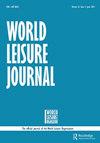A welcome letter to all leisure friends
IF 2
Q3 HOSPITALITY, LEISURE, SPORT & TOURISM
引用次数: 2
Abstract
Dear World Leisure Journal Readers, Dear Leisure Researchers, Students, Enthusiasts. In June 2023, I was appointed as Editor-in-Chief of the World Leisure Journal (WLJ). It was a bit of a surprise, because coming from Brazil I never expected that such role would be available for me. One of the barriers I perceived was that English is my second (or third) language (I was fluent in Italian before I started to learn English). Furthermore, in the past, I always looked at editorial roles with a degree of scepticism. In my early days in academia, I believed that the Editor-in-Chief was invariably occupied by a white, English-native, male Professor. Of course, I also need to acknowledge my privilege as a white man in a field that still needs to be more diverse. Indeed, a paper I recently co-authored demonstrates that Leisure journals still lack diversity in their Editorial Boards (Carnicelli & Uvinha, 2023). However, at the same time, in recent years I have seen colleagues including Atara Sivan, Heather Gibson, Catheryn Khoo, Cathy Hsu, Donna Chambers, and Sara Dolnicar doing amazing things and really transforming the fields of leisure, tourism, and hospitality with outstanding editorship, support to early career researchers, and promoting opportunities to scholars from the Global South. Indeed, the first and most urgent action I had to take in my Editor-in-Chief role was to diversify the World Leisure Journal Editorial Board. I prioritized this action because it is intrinsically linked to how I believe leisure research and knowledge development should go forward. The Anglophonic world still knows close to nothing about leisure research and knowledge in the Global South. Anglophonic researchers (mostly) limit themselves to what is written in English and published in what they see as “top” journals according to lists that classify journals based on contested metrics. On the other hand, the Anglophonic publishing system excludes those from the Global South who are not fluent in English. At this stage, you may be thinking “how cynical is Sandro criticising the publishing system while editing a journal that only accepts papers in English?”. Well, that is one of the biggest aims (and challenges) of my tenure. Can we publish papers in multiple languages? Can we use technology and Artificial Intelligence to facilitate that? Can we develop partnerships with journals in other countries to re-publish some of their papers in English? Can we allow them to publish our paper in their language free of cost? Can we make sure we break barriers that exclude? If we consider the publication of academic journals (and here I have many criticisms to the current neoliberal logic of academic publication) I believe that they play two important roles. First, they are an important tool for the communication of ideas, science, and knowledge. Second, they can encourage and stimulate practical changes in the research agenda, in research paradigms, but also in, for example, policy and the teaching curriculum. This is an exciting time to do Leisure research. The revolution that technology is creating with the Metaverse and new Artificial Intelligence tools like ChatGPT will keep transforming our leisure experiences but also what and how we communicate our leisure knowledge and experiences. Changes in geo-political relations after the COVID-19 pandemic and the rise of authoritarian governments are generating debates about leisure rights, freedom, and privacy. COVID-19 also significantly changed our work-relations, working contracts, and致所有闲暇朋友的欢迎信
亲爱的世界休闲杂志读者,亲爱的休闲研究者,学生,爱好者。2023年6月,我被任命为《世界休闲杂志》(WLJ)主编。这有点出乎我的意料,因为我来自巴西,从来没有想过这样的角色会适合我。我意识到的障碍之一是英语是我的第二(或第三)语言(在我开始学习英语之前,我能说流利的意大利语)。此外,在过去,我总是带着一定程度的怀疑态度看待编辑角色。在我早期的学术生涯中,我认为总编辑总是由一个英语母语的白人男性教授担任。当然,我也需要承认,作为一名白人,我在这个仍然需要更加多样化的领域享有特权。事实上,我最近与人合著的一篇论文表明,休闲期刊的编委会仍然缺乏多样性(Carnicelli & Uvinha, 2023)。然而,与此同时,近年来,我看到包括Atara Sivan、Heather Gibson、catherine Khoo、Cathy Hsu、Donna Chambers和Sara Dolnicar在内的同事们做了令人惊叹的事情,通过出色的编辑工作,对早期职业研究人员的支持,以及为来自全球南方的学者提供机会,真正改变了休闲、旅游和酒店领域。事实上,作为总编辑,我必须采取的第一项也是最紧急的行动是使《世界休闲杂志》编辑委员会多样化。我优先考虑这一行动,因为它与我认为休闲研究和知识发展应该如何向前发展有着内在的联系。以英语为母语的世界仍然对南半球的休闲研究和知识几乎一无所知。以英语为母语的研究人员(大多数)将自己局限于用英语撰写的文章,并根据有争议的指标对期刊进行分类的列表,将其发表在他们认为的“顶级”期刊上。另一方面,以英语为母语的出版体系排除了那些英语不流利的南方国家的人。在这个阶段,你可能会想:“桑德罗一边编辑一本只接受英文论文的期刊,一边批评出版体系,这是多么愤世嫉俗啊?”这是我任期内最大的目标(和挑战)之一。我们可以用多种语言发表论文吗?我们能否利用科技和人工智能来促进这一点?我们能否与其他国家的期刊建立伙伴关系,以重新发表他们的一些英文论文?我们能让他们免费用他们的语言发表我们的论文吗?我们能确保打破排斥的障碍吗?如果我们考虑学术期刊的出版(在这里,我对当前学术出版的新自由主义逻辑有许多批评),我认为它们扮演着两个重要的角色。首先,它们是思想、科学和知识交流的重要工具。其次,它们可以鼓励和刺激研究议程、研究范式以及政策和教学课程等方面的实际变化。这是做休闲研究的一个激动人心的时刻。科技带来的Metaverse和ChatGPT等新的人工智能工具带来的革命将不断改变我们的休闲体验,也将改变我们交流休闲知识和体验的方式。新型冠状病毒感染症(COVID-19)大流行后,地缘政治关系的变化和独裁政府的崛起,引发了关于休闲权、自由、隐私的争论。COVID-19也极大地改变了我们的工作关系、工作合同和
本文章由计算机程序翻译,如有差异,请以英文原文为准。
求助全文
约1分钟内获得全文
求助全文
来源期刊

World Leisure Journal
HOSPITALITY, LEISURE, SPORT & TOURISM-
CiteScore
3.10
自引率
6.20%
发文量
34
期刊介绍:
As the official journal of the World Leisure Organisation, the purpose of the World Leisure Journal is to stimulate and communicate research, theory, and critical thought in all areas that address leisure, including play, recreation, the arts and culture, sport, festivals, events and celebrations, health and fitness, and travel and tourism. Empirical and theoretical manuscripts, as well as position papers, review articles, and critical essays are published in the World Leisure Journal . The World Leisure Journal is international in scope, and encourages submissions from authors from all areas of the world. Comparative cross-national and cross-cultural research reports are especially welcome. For empirical papers, all types of research methods are appropriate and the subject matter in papers may be addressed from perspectives derived from the social, behavioural, and biological sciences, education, and the humanities. Both pure and applied research reports are appropriate for publication in the World Leisure Journal . In addition to original research reports and review essays, book reviews, research notes, comments, and methodological contributions are appropriate for publication in the World Leisure Journal .
 求助内容:
求助内容: 应助结果提醒方式:
应助结果提醒方式:


